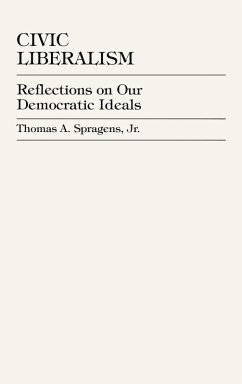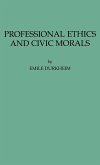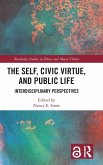In Civic Liberalism, prominent political theorist Thomas A. Spragens, Jr. asserts that most versions of democratic ideals-libertarianism, liberal egalitarianism, difference liberalism, and the liberalism of fear-lead our polity significantly astray. Spragens offers another alternative. He argues that we should recover the multiple and complex aspirations found within the tradition of democratic liberalism and integrate them into a more compelling public philosophy for our time-or what he calls civic liberalism.
Hinweis: Dieser Artikel kann nur an eine deutsche Lieferadresse ausgeliefert werden.
Hinweis: Dieser Artikel kann nur an eine deutsche Lieferadresse ausgeliefert werden.
Civic Liberalism defines a new liberalism suitable for contemporary life. Approaching his task through a nuanced reading of several contending perspectives, Spragens articulates a vision that will convince many and challenge the rest of us to refine our thinking further. This book is a model of critical engagement and reflective construction. -- William E. Connolly, author, Capitalism and Christianity, American Style Style author of Capitalism and Christianity, American Style author of Capitalism and Christianity, American Style Spragens' Civic Liberalism offers an appreciative and thoughtful critique of both libertarianism and of liberal egalitarianism as a prelude to constructing his own 'civic liberal' alternative. Part theoretical treatise, part guide for the perplexed democratic citizen, Civic Liberalism offers a new vision of political possibilities. -- Terence Ball, Arizona State University Thomas Spragen's Civic Liberalism is a fine critique of contemporary public theorizing about democracy and a creative and daring effort to point a new direction based on what is best and most enduring in our traditions. Spragens' is a grand voice, learned, accessible, and challenging and Civic Liberalism makes an invaluable contribution to public debate. -- Wilson Carey McWilliams, Rutgers University "Spragens' vision of civic liberalism is marked by the same qualities which characterize his defense of it in this wise and important book: reflective awareness, critical intelligence, and a spirit of generosity toward those with whom he disagrees that is truly liberal. -- Patrick Neal, University of Vermont Civic Liberalism: Reflections on Our Democratic Ideals is a stimulating work, breaking new ground in drawing together both liberal and democratic thought and ideals. Spragens does this in working with very familiar materials from both the cannon as well as contemporary political theory, reading them in a fresh thought-provoking way... Furthermore, Spragens introduces exciting concepts to liberal democratic theory that have received little or no attention in the current debates... This is a welcome addition to the literature on liberal democratic theory. -- Ronald Terchek, University of Maryland A very important book. Thorough. Carefully argued and laid out. The very best of its kind. For everyone interested in the foundations of contemporary thought. -- Amitai Etzioni, George Washington University Thomas Spragens is committed to an idea of political theory as dialectic in an ancient and illustrious sense of that term, namely refining his own understanding of political ideals through reasoned conversation with leading alternatives that currently contend with each other. Recently, some of the most thoughtful liberal thinkers have tried to address the civic dimension of liberalism, and to articulate theoretically what conditions must be met in order for liberal society to provide a richer sense of common citizenship. Spragens, with his calm reflectiveness and accessible prose, makes an important contribution to these efforts." -- Ronald Beiner, University of Toronto The vexing problem is that liberal political theory does not yield an image of humanity that has real moral meaning. Herein, Thomas Spragens, with his usual good sense and fine scholarship, shows how a subtle reweaving of liberal democratic political theory can provide us with a moral message we might actually want to encourage one another to live by. His book is literate and thoughtful, the product of a lifetime of reflection on these problems. His critique of the dominant liberal democratic theorists and theories is fresh, wise, and often surprising. -- Charles W. Anderson, University of Wisconsin, Madison It is obvious from this thoughtful and well-written work that Spragens has thought and read extensively about contemporary liberalism ... Civic Liberalism provides an excellent secondary source for students of 20th-century liberalism. -- M. Coulter, Grove City College CHOICE A thoughtful, engagingly committed book. -- Mark Evans Political Studies Review Of the many endeavors in the last three decades to restate the central aspiratons of liberalism, this important work is one of the most balanced, nuanced, and cogent. ...There is much to admire in this work: its criticisms are incisive, but balanced; its restatement of liberal ideals is nuanced, mindful of the trade-offs among political goods, persuasive, and well moored in the moral intuitions underlying liberal pracice; its spirit is genearous, though tough-minded; its style is clear, lively, and friendly. Indeed the work exemplifies many of the ideals that civic liberalism extols. -- Stanley C. Brubaker American Political Science Review









